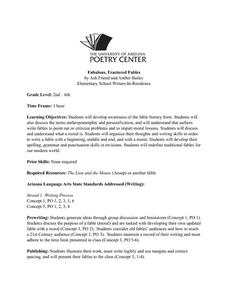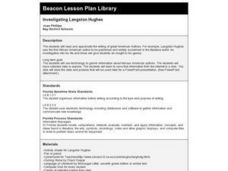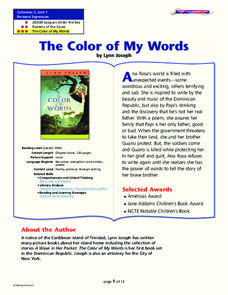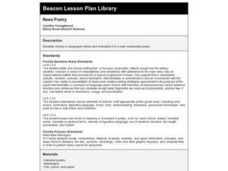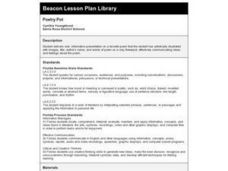Curated OER
Fabulous, Fractured Fables
Elementary schoolers develop an awareness of the literary form known as the fable. They explore how authors write fables to pass along moral lessons. After reading and discussing many famous fables embedded in the plan, learners attempt...
Curated OER
Investigating Langston Hughes
Third graders read and appreciate the writing of great American Authors. use technology to garner information about famous American authors. They have selected sites to explore. The information they save be used for a future Powerpoint.
Curated OER
Impacting Indiana
Fourth graders become familiar with the culture and history of Indiana. For this James Whitcomb Riley lesson, 4th graders read poetry which includes the dialect of Indiana. Students analyze the poem. Groups memorize and...
Curated OER
The Color of My Words
Explore the story The Color of My Words by Lynn Joseph using this resource. Learners answer comprehension questions, fill in graphic organizers, and write a poem.
Southern Nevada Regional Professional Development Program
Close Reading in the Classroom
Close reading is key to the analysis and interpretation of literature. A close reading of the title and the epigraph of “The Love Song of J. Alfred Prufrock” offers readers an opportunity to examine how even single words or names can...
Classroom Adventures Program
Creating Characters
Examine character in depth. Over the course of these six lessons, learners explore their own character traits, determine the traits of characters in the books they read, practice comparing and contrasting, and collaborate in small...
Novelinks
Tuck Everlasting: Similes, Metaphors, and Personification in Imagery
Poetic language is abundant in Natalie Babbitt's beautiful novel, Tuck Everlasting. Learners note the examples of similes, metaphors, and personification they find as they read, and illustrate how the language creates a sensory...
Curated OER
Literature and History of the Holocaust
Students examine quotes and text passages related to the Holocaust. They generate a list of questions about the Holocaust and analyze a piece of writing based on the authorship of the work. They infer the meaning of a poem and determine...
Curated OER
Focus On Figurative Language in Prose
Students examine the use of literary prose in the story, "Dark They Were, and Golden-Eyed." In this literary prose instructional activity, students investigate the use of imagery, metaphor, and simile in the story. They tell how author's...
Bully Free Systems
Bully Free Lesson Plans—Eighth Grade
Middle schoolers are likely very familiar with the concept of bullying and cliques. Discuss their experiences and brainstorm ways to handle peer conflict and feelings of exclusion with a poem that focuses on bullying, and a second...
Curated OER
Valentine's Day: Love Letters
Oh the joys of love! As a special Valentine's Day assignment, budding authors research the life of one of the most romantic poets, Keats. They read the letter, "To Fanny Brawne, 13 October 1819," then compose a love letter of their own....
Curated OER
Digging Deep for Figurative Language (Hyperbole)
What are hyperboles? Examine the attributes of hyperboles with your high school classes. Pupils read selected poems and prose selections that feature hyperboles and discuss their functions in each work of literature. Specific poems and...
Curated OER
Post-Colonial Writers Unit
How do cultural and historical background impact thought? To explore this essential question, class members view of portion of the film, The Passage to India, read an excerpt from The Magician’s Nephew, and Nissim Ezekiel’s...
Curated OER
Analyzing the Use of Irony in a Short Story
Ninth graders examine how literature connects to real-life and see how irony aids in the development of theme. They read Shirley Jackson's The Lottery, and discuss elements of foreshadowing and situational irony. Then learners will write...
Curated OER
A Modest Proposal: Irony Made Understandable with Rock and Roll
Who doesn't love music? Poems and songs will engage your high school class in a discussion about irony. Use songs like "Rockin' in the Free World" or "Born in the U.S.A." to illustrate the ironic point of view. Print the lyrics so...
Curated OER
Introduction to Ludwig van Beethoven
"Ode to la Tortilla" and "Ode to Joy"? Sure! Use Gary Soto's poem to introduce learners to the ode format. After examining the descriptive words Soto uses, class members study a poster of Ludwig van Beethoven, suggest words that describe...
Curated OER
Wanted: New Authors!
Eighth graders write a short autobiographical sketch and produce an author page to be used throughout the year with their writing. They take digital camera photos and produce a PowerPoint slide show with their photos and information.
Curated OER
Native American and Colonial Literature Debate
Students compare the tone, purpose, point of view, etc. of traditional Native American poems and creation myths to traditional Colonial American literature. they debate which is the right way of thinking/living.
Curated OER
Deshawn's Days
Students read about a boy while exploring poetry. In this poetry lesson, students discuss how Deshawn's neighborhood and family are described.
Curated OER
Auto-Bio Poem
Students create an autobiographical poem. In this writing lesson, students write an eleven line autobiopoem after read the teacher's model. Students include their name, fears, and family in the poem.
Curated OER
Geo Jammin' - Day 5, Lesson 16: Capturing "Lions" of Poetry
Second graders participate in the Author's Chair, which is placed in the front of the room. The puppet, Geo George, asks students to take out their poems, then brings them to the Author's Chair individually to share their poems with the...
Curated OER
News Poetry
Third graders select a small item in a newspaper and then dramatize it in a well-constructed poem. They share their poems with the class.
Curated OER
Poetry Pot
Third graders illustrate a favorite poem with images, title, author's name and words of the poem on a clay pot.
Curated OER
pOETRY cUBS
Students develop an appreciation for different styles of poetry. It is also an excellent way to introduce a holiday, season, or theme. They also learn different techniques for memorization.
